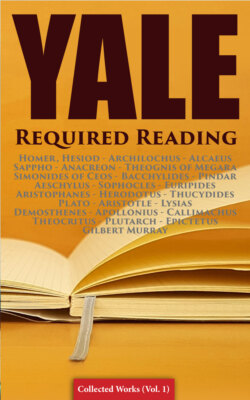Читать книгу Yale Required Reading - Collected Works (Vol. 1) - Anacreon - Страница 61
На сайте Литреса книга снята с продажи.
THE HYMN TO HERMES
ОглавлениеTable of Contents
The Hymn to Hermes is remarkable for the corruption of the text, which appears even to present lacunæ. The English reader will naturally prefer the lively and charming version of Shelley to any other. The poet can tell and adorn the story without visibly floundering in the pitfalls of a dislocated text. If we may judge by line 51, and if Greek musical tradition be correct, the date of the Hymn cannot be earlier than the fortieth Olympiad. About that period Terpander is said to have given the lyre seven strings (as Mercury does in the poem), in place of the previous four strings. The date of Terpander is dubious, but probably the seven-stringed lyre had long been in common use before the poet attributed the invention to Hermes. The same argument applies to the antiquity of writing, assigned by poets as the invention of various mythical and prehistoric heroes. But the poets were not careful archæologists, and regarded anachronisms as genially as did Shakespeare or Scott. Moreover, the fact that Terpander did invent the seven chords is not beyond dispute historically, while, mythically, Apollo and Amphion are credited with the idea. That Hermes invented fire-sticks seems a fable which robs Prometheus of the honour. We must not look for any kind of consistency in myth.
The learned differ as to the precise purpose of the Hymn, and some even exclude the invention of the cithara. To myself it seems that the poet chiefly revels in a very familiar subject of savage humour (notably among the Zulus), the extraordinary feats and tricks of a tiny and apparently feeble and helpless person or animal, such as Brer Rabbit. The triumph of astuteness over strength (a triumph here assigned to the infancy of a God) is the theme. Hermes is here a rustic doublure of Apollo, as he was, in fact, mainly a rural deity, though he became the Messenger of the Gods, and the Guide of Souls outworn. In these respects he answers to the Australian Grogoragally, in his double relation to the Father, Boyma, and to men living and dead.37a
As a go-between of Gods and men, Hermes may be a doublure of Apollo, but, as the Hymn shows, he aspired in vain to Apollo’s oracular function. In one respect his behaviour has a singular savage parallel. His shoes woven of twigs, so as not to show the direction in which he is proceeding, answer to the equally shapeless feather sandals of the blacks who “go Kurdaitcha,” that is, as avengers of blood. I have nowhere else found this practice as to the shoes, which, after all, cannot conceal the direction of the spoor from a native tracker.37b The trick of driving the cattle backwards answers to the old legend that Bruce reversed the shoes of his horse when he fled from the court of Edward I.
The humour of the Hymn is rather rustic: cattle theft is the chief joke, cattle theft by a baby. The God, divine as he is, feels his mouth water for roast beef, a primitive conception. In fact, throughout this Hymn we are far from the solemn regard paid to Apollo, from the wistful beauty of the Hymn to Demeter, and from the gladness and melancholy of the Hymn to Aphrodite. Sportive myths are treated sportively, as in the story of Ares and Aphrodite in the Odyssey. Myths contained all conceivable elements, among others that of humour, to which the poet here abandons himself. The statues and symbols of Hermes were inviolably sacred; as Guide of Souls he played the part of comforter and friend: he brought men all things lucky and fortunate: he made the cattle bring forth abundantly: he had the golden wand of wealth. But he was also tricksy as a Brownie or as Puck; and that fairy aspect of his character and legend, he being the midnight thief whose maraudings account for the unexplained disappearances of things, is the chief topic of the gay and reckless hymn. Even the Gods, even angry Apollo, are moved to laughter, for over sport and playfulness, too, Greek religion throws her sanction. At the dishonesties of commerce (clearly regarded as a form of theft) Hermes winks his laughing eyes (line 516). This is not an early Socialistic protest against “Commercialism.” The early traders, like the Vikings, were alternately pirates and hucksters, as opportunity served. Every occupation must have its heavenly patron, its departmental deity, and Hermes protects thieves and raiders, “minions of the moon,” “clerks of St. Nicholas.” His very birth is a stolen thing, the darkling fruit of a divine amour in a dusky cavern. Il chasse de race.39
